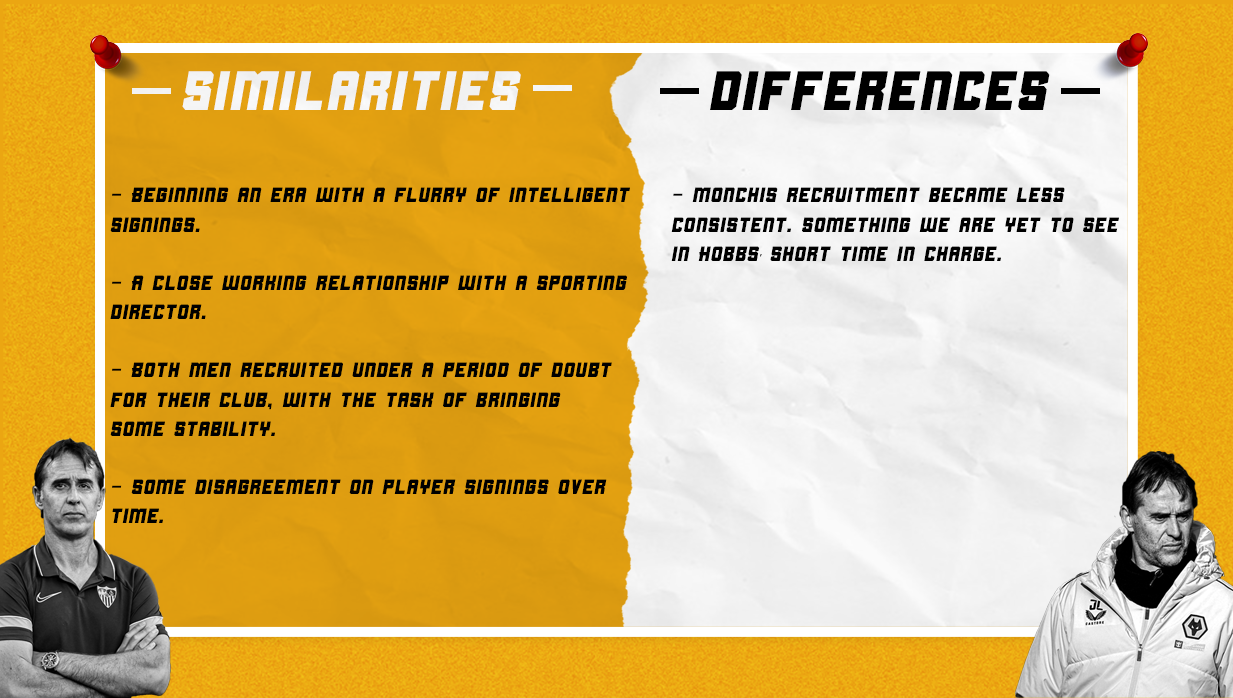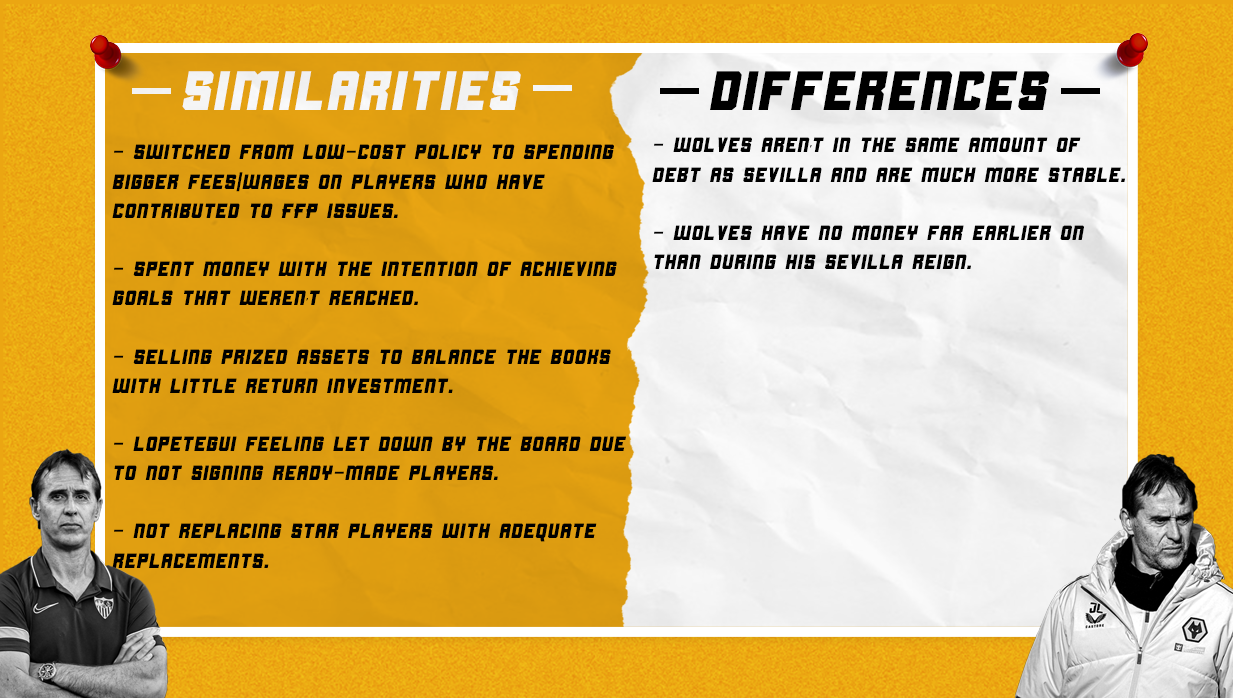Julen Lopetegui did what fans feared most as he and Wolves agreed to part ways just days before the start of the season, leaving the club in a state of near turmoil. However, for those who know about the end of his reign at Sevilla, it doesn’t come as much of a surprise.
At Wolves, he found himself, yet again, at the heart of a club in need of a revamp and in financial trouble. His last season at Sevilla was marred with warning signs from past campaigns, as was his current one with Wolves.
With key players leaving to help balance the books, and money not being available to get adequate replacements, it seemed once again that the Spaniard was going to have to endure a difficult campaign with his bottle and tactical nouse strained more than ever before.
Finding himself at loggerheads with his board is not something new, and FOSUN should’ve seen this coming when they decided to restrict funds due to their spending in January.
Despite great achievements at Sevilla, behind-the-scenes issues plagued his last season in charge. So the key question is, was his new tenure plagued by the same issues as in Spain, and should FOSUN have seen this coming?
What are the similarities and differences between his time in Seville and Wolverhampton? Let’s take a look.
A bit of context:
By the time Lopetegui had been appointed, Sevilla had experienced a chaotic few seasons behind the scenes, masked by impressive performances on the field by key players.
President Jose Maria Del Nido had also been arrested on corruption charges and fans were understandably frustrated at a lack of stability at the top.
Legendary sporting director Monchi had left for Roma, and Sevilla’s managerial and playing recruitment had suffered as a result, with Monchi also suffering a poor run of recruitment at AS Roma.
Monchi returned to Sevilla in 2019, and with him came Lopetegui. They were tasked with bringing some stability to the club with smart signings and tactical nouse, something Monchi thought was a given due to Lopetegui’s pedigree.
With 3 successive top 4 finishes and a Europa League win, it’s fair to say it worked.
Hobbs and Lop – The biggest ‘what could’ve been?’
One key point of note was that Lopetegui had a very good relationship with Sevilla sporting director Monchi, according to The Analyst.
They managed to sign players from smaller, niche markets and develop them into better players. They had some huge successes such as Diego Carlos and Jules Kounde, but also recruited some duds across their few years together.
The first window under Lopetegui marked wholesale changes and some intelligent buys with him and Monchi working well in tandem to rejuvenate the Sevilla squad, with seven new players lining up in his first team.
Not too dissimilar to the start he had at Wolves during the January window, where he brought in five first-team-ready players.
The synergy between Matt Hobbs and Lopetegui in the January transfer window was quickly picked up on and expressed in interviews by Hobbs. A good sign for Wolves and one which would’ve sounded oddly similar to Sevilla in 2019.
Both men were newly appointed (although Hobbs was promoted from within) and they were both set the task of leading the club through a challenging period and to get them competing at a higher level.
Whilst they managed to comfortably keep Wolves up, there is a real feeling FOSUN could have taken advantage of this blossoming partnership to try and recreate a similar effect to what Monchi and Lopetegui did at Sevilla.
In the last year of Lopetegui’s reign, Sevilla’s recruitment didn’t quite hit the same heights with Monchi seemingly losing his mojo.
Due to the small sample size for Hobbs and Lopetegui’s work together we can only theorize how their recruitment could’ve played out.
There was some disagreement on player signings, Hobbs had eluded to wanting to keep Nathan Collins despite him being sold to Brentford. Monchi had similar issues with Lopetegui’s decision to sign Isco on a free transfer.
Despite that, it’s certainly a frustrating end to what could have and should have been a long and fruitful relationship between manager and sporting director – what was a rare sense of stability for Wolves.

Spending of the past haunting the present
Sevilla and Wolves have had similar strategy changes whereby they banked on success or achieving a certain goal to maintain their spending. They aren’t the first clubs to do it, but it represents a dangerous strategy.
In his second season in Sevilla, they began to sign experienced players on bigger wages, relying on qualifying for the Champions League and progressing into the knockouts. Being knocked out early in the group stage began their issues with FFP in Spain.
The issue was that other clubs knew of Sevilla’s very public financial troubles, therefore lessening their bargaining power in the transfer window (starting to sound familiar anyone?).
Wolves pursued a similar strategy by spending big money on players to try and push the club back into Europe. What ensued was a perfect example of poor squad building and a lack of understanding of how to balance a team.
You could argue this began under Nuno with the acquisitions of Fabio Silva and Nelson Semedo. Whilst they have performed to a decent standard it’s hard to see past the roughly £60m fee it took to bring them in. They have seen no return on that investment.
Another £30m was spent on Goncalo Guedes and £40m was thrown at Matheus Nunes. Guedes never wanted to join and only lasted six months, and Nunes was underwhelming at best.
They signed players for high fees with increasingly poorer resale value due to age and/or poor performances, leading to them having financial issues down the line.
Wolves have also taken a three-year bank loan from Macquarie against their Premier League revenue, meaning if relegation were to occur, they could be in potentially deeper financial trouble.
A lack of financial security and spending left three of Sevilla’s managers competing with a stale squad with a lack of previous star power, as was the issue for Nuno (in his final season), Bruno Lage, and now Lopetegui.
When Lopetegui joined in November 2022, the spending of the Nuno and Lage eras was already plaguing the club. Then they spent around £100m in January 2023 to keep the club from dropping into the championship.
With Sevilla being in a chasm of debt this summer, the story is starting to sound similar…
Sevilla’s financial issues left Lopetegui with an increasingly aging squad of players and without the money to replace them. Whilst Wolves’ squad wasn’t old when he was appointed, it was more or less stale after a couple of years of stagnation when Lopetegui arrived.
Again, without the money to revamp it bar a few new signings in the January window.
Sevilla also had to sell their star centre-back pairing of Diego Carlos and Jules Kounde just to balance the books. Similar to what Wolves have done this summer.
In fact, the side has been left with only two senior centre-backs in the entire squad, namely Max Kilman and Craig Dawson.
Sevilla raised 90m Euros in sales in the summer of 2022 but only reinvested 28m Euros of that money. Some of that on free agents. This was due to older players on big wages refusing to leave and causing strain on their finances.
Lopetegui felt let down by the board for not signing ready-made players for the Champions League. A quote from The Analyst during his time in Seville states “Lopetegui, an embattled manager coming into the season, feels like the club hasn’t properly backed him.”
A similar narrative has played out this summer with Lopetegui again feeling aggrieved at the lack of support and resources available to sign what he feels are ready-made players.
Lopetegui has twice now inherited a squad in need of a revamp. This time he faced the issues he did in his last season with Sevilla but in his first with Wolves.

A story of two sides
Lopetegui was known at Sevilla for bringing passion back to the club, something which Wolves fans have seen plenty of since he joined.
Some will argue that the squad is still far better than the one left to Bruno Lage, and you would have a case to make. Wolves’ squad is young and full of flexibility, energy, and technical quality.
With the vast wages paid to him and his staff you could make a case that, as an elite coach, he could have stayed and worked with what he had. Something coaches have had to show in past eras in order to prove their worth as elite.
However, at the same time, a manager of his caliber will not accept the bare minimum considering he was dragged from a personal family issue and joined after a very taxing final season at Sevilla.
Unfortunately, that is what FOSUN have delivered. Whilst you have to respect the fact they don’t want to ruin the club financially, there is still a looming issue of what happens if Wolves do go down.
Whilst some may argue his stabs at the board did not help the sense of unity Wolves needed, you can hardly blame him if he was not properly informed of the financial situation before the summer.
It’s all well and good wanting to wait until next summer so Wolves aren’t in unassailable debt, but if they go down this strategy doesn’t matter. It’s simply a huge risk and Lopetegui knew it.
The search will have to go on to find an adequate replacement, but the overarching frustration is that FOSUN really missed a golden opportunity to push for the top half and even Europe after getting the manager they have wanted since they took over.
